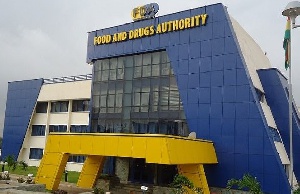The Bono Regional Office of the Food and Drugs Authority (FDA) has embarked on a public education and sensitization program with hairdressers and apprentices at Nkoranza in the Bono Region on the effects of abusing Tramadol and other substances.
In recent times, Ghana has been under a public health and social threat where persons, usually the youth, abuse Tramadol popularly known as ‘Tramol’ in higher doses (120mg, 200mg, 225mg and 250mg). A recently conducted survey revealed that most youth use Tramadol to gain extra energy for their work, get dazed for restful sleep, to stay alert to study or just to get the state of euphoria.
The team informed the participants that, Tramadol is a man-made narcotic analgesic (pain reliever) prescription used to treat moderate to severe pain.
The approved dosage strength of Tramadol registered for use in Ghana by the FDA is 50mg and 100mg in tablets or capsules and 50mg/ml-2ml in injections.
The rapid abuse of the drug, created the necessity to restrict Tramadol as a Controlled Substance till date.
Participants were also informed that because Tramadol is a man-made narcotic; it works similarly to illegal drugs like cocaine and heroin and may have similar effects on its victims. It was also observed with concern that sections of the youth combine Tramadol with other substances like energy drinks and marijuana to give the needed effect and satisfaction they desire.
The abuse of Tramadol therefore results in headache, dizziness, drowsiness, fatigue, constipation, diarrhea, nausea, vomiting, stomach pain, confusion, brain damage and itching. Other symptoms of the abuse are sweating, flushing (warmth, redness, or tingly feeling), noisy breathing, sighing, shallow breathing, a slow heart rate or weak pulse, a light-headed feeling (like you might pass out), seizures (convulsions), infertility, missed menstrual periods, impotence, sexual problems and loss of interest in sex.
The officers however seized the opportunity to further educate the participants on the effects of other substances such as tobacco and tobacco products including ‘shisha’.
Recent observation shows that more women than men smoke shisha for the ecstatic feeling and flavor.
The team also emphasized that there is no safe form of tobacco and warned against smoking ‘shisha’, since it contains toxic substances that expose them to cancer, heart disease and pregnancy-related diseases.
The team assured the participants of the FDA’s resolve within its mandate to ensure an eventual eradication of these dangers which has a wide reaching negative effect on public health and was further advised to desist from this dangerous practice and to share their insights from the sensitization program in their various neighborhoods.
Health News of Monday, 16 September 2019
Source: laudbusiness.com
Tramadol works like cocaine, stay away from it – FDA warns
Business
















